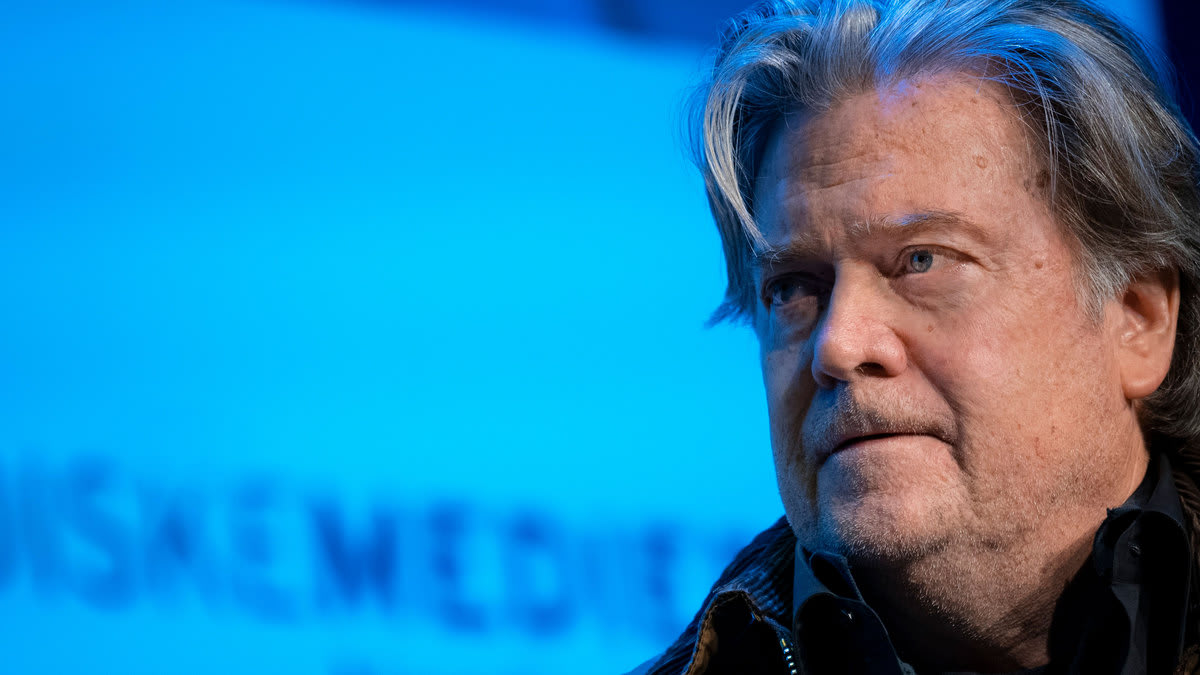Steve Bannon, once former President Donald Trump’s chief strategist, has placed himself on a path to now be his chief martyr.
On Tuesday evening, the special congressional committee investigating the Jan. 6 insurrection voted to find Bannon “in contempt of Congress” for refusing to answer questions or deliver documents, as the panel seeks to examine his role in organizing and inspiring the violent assault on the Capitol.
“It's a shame that Mr. Bannon has put us in this position, but we won't take no for an answer,” said the chair of the investigative committee, Rep. Bennie G. Thompson, (D-MS). “Mr. Bannon will comply with our investigation, or he will face the consequences. Maybe he's willing to be a martyr to a disgraceful cause of whitewashing what happened on Jan. 6.”
“We cannot allow anyone to stand in the way of the select committee as we work our way to get the facts. The stakes are just too high,” Thompson said shortly before the vote.
Now that the committee has advanced its recommendation to hold Bannon in “contempt of Congress,” the full House is expected to vote on the matter on Thursday. If the resolution is adopted by the Democratic House as expected, the contempt recommendation would then go to Channing D. Phillips, the acting U.S. Attorney for the District of Columbia. Democrats are hoping the Department of Justice will move swiftly to hold Bannon in contempt and potentially send him to jail for up to one year, while also potentially fining him up to $100,000.
But that punishment might take years to litigate, as Bannon ties up the court with legal challenges over dubious claims of executive privilege. And while Congress has the power to hold people in contempt, the power is rarely used—and hasn’t resulted in a criminal indictment in nearly 40 years.
Bannon’s case centers around his refusal to comply with subpoenas over his role in the Jan. 6 attack on the Capitol. The special committee issued a subpoena on Sept. 23 demanding that Bannon turn over records and show up for a deposition the next month.
But Bannon refused to deliver documents by the Oct. 7 deadline, and he was a no-show at his scheduled congressional testimony on Oct. 14.
Instead, Bannon’s New York City attorney, Bob Costello, sent the committee letters stating that Bannon simply would not cooperate.
The committee laid out its motives for questioning Bannon in a resolution, noting that Bannon “appears to have had multiple roles relevant to this investigation, including his role in constructing and participating in the ‘stop the steal’ public relations effort that motivated the attack.” The resolution says Bannon maintained a ‘‘war room’’ at the Willard InterContinental Hotel in Washington, D.C., and “reportedly spoke with Mr. Trump directly regarding the plans for January 6th on at least one occasion.”
It’s that connection to Trump that Bannon is using as a defense for not cooperating.
In early October, Bannon’s legal team informed the committee that he would defy the subpoena, relying on a novel legal approach by citing Trump’s “executive privilege”—even though Trump is clearly no longer president and Bannon was not employed by the White House at the time of the attack.
That argument notwithstanding, Bannon and his legal team don’t seem eager to make their argument in court. On Monday, just as Trump filed his own lawsuit against the committee to block it from acquiring and inspecting his presidential records, Costello quickly fired off a one-paragraph letter asking for an extra week to “thoughtfully assess the impact of this pending litigation.” On Tuesday, Thompson wrote back swiftly rejecting the request, noting that Trump’s lawsuit had nothing to do with Bannon’s testimony.
“The investigation of the Select Committee is extremely important and urgent for the nation, and further delay in compliance by Mr. Bannon undermines the ability of the Committee to timely complete its essential responsibilities,” Thompson wrote.
The Biden administration also rejected the delay attempt. A response letter on Monday signed by White House lawyer Jonathan C. Su noted that the president has already decided to not assert executive privilege and will allow congressional investigators to press on.
“At this point, we are not aware of any basis for your client’s refusal to appear for a deposition,” wrote Su, who is listed as deputy counsel to the president.
During Tuesday’s meeting, the committee’s vice chair, Rep. Liz Cheney (R-WY), said that the privilege arguments by Bannon and Trump appear to hint at guilt.
“They suggest that President Trump was personally involved in the planning and execution of January 6, and this committee will get to the bottom of that,” Cheney said.
Bannon’s long-time press contact, Alexandra Preate, did not immediately respond to requests for comment. Preate, the daughter of a former Pennsylvania attorney general, founded the New York City public relations firm Capital HQ and got into hot water in 2017 for being an unpaid “shadow” press secretary at the Trump White House.
Congressman Thompson also made a curious point at the meeting, noting "how isolated" Bannon is in resisting the committee's demands for testimony and records.
"Mr. Bannon stands alone in his complete defiance of our subpoena," Thompson said, noting the importance in punishing him out of concern that his act of rebellion "may encourage others to follow Mr. Bannon down the same path."
The investigative group has issued similar subpoenas to Trump's final White House chief of staff, Mark Meadows, and a former advisor, Kash Patel. Both could be considered hostile witnesses. It's still not publicly known whether they have complied with the committee's demands, but Thompson's statement was meant to be taken as a hint that they are—or will.
This act of defiance is typical Bannon.
For years, Bannon has helped fuel the rise of far-right politics with media ventures like the news website Breitbart and his current podcast War Room. On that daily online talk radio show, Bannon repeatedly bangs the civil war drum, casting Biden’s presidency as an illegitimate “regime” and rallying his supporters in a complete rejection of authority—that is, under current Democratic leadership.
Bannon often employs military science and gun culture code words, like when he asks his listeners to be a “force multiplier” to form a resistance against mask mandates.
He also defied convention when he tried to setup a gladiator school for ultra-right nationalists at an 800-year-old Italian monastery on the outskirts of Rome—a plan that sparked worries about its potential to revive a worldwide fascist movement and was ultimately blocked by Italy’s Council of State.
As far as this legal battle against the government, Bannon is no stranger to fighting subpoenas. For more than a year, Bannon successfully fought off the Federal Trade Commission’s attempt to sit him down for questioning.
That case centered around Bannon serving on the board of tech firm Cambridge Analytica, which was caught improperly accessing Facebook to build voter profiles and help the 2016 Trump campaign. At the time, Bannon was also CEO of the Trump campaign.
The FTC issued an administrative subpoena to question Bannon and figure out whether he had abused his position, using a “civil investigative demand” in an attempt to force him into a deposition. But Bannon delayed it for months, eventually forcing the FTC to sue him in federal court.
U.S. District Judge Christopher Cooper granted the FTC’s petition, but the federal agency refused to tell The Daily Beast whether that interview ever took place.
Although the prospect of being at the receiving end of the DOJ sounds disquieting, Bannon may feel emboldened. After all, he’s been let off the hook before—by the very same president he’d managed to piss off.
Federal agents arrested him in August 2020, when Bannon was charged with stealing more than $1 million from a “We Build the Wall” fundraiser. But he was pardoned by Trump during the president’s last hours in office in January, with a statement noting that, “Mr. Bannon has been an important leader in the conservative movement and is known for his political acumen.”
The move surprised some, given that Trump once described feeling “betrayed” by his Bannon after his former advisor was quoted bashing Trump family members in Michael Wolff’s tell-all book “Fire and Fury: Inside the Trump White House.”
But actions speak louder than words, and Bannon’s taunting of the Biden administration, Congress, and the Justice Department have put him on a path to potentially pay an ultimate price for loyalty for a former president who continues to assert a claim to the throne.

